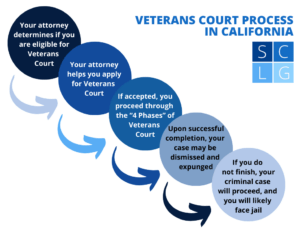
California’s Veterans Treatment Court is an intensive rehabilitation program that allows certain former military members who are facing criminal charges to possibly avoid jail and a criminal record. In order to be considered, you need to be
- eligible for probation, and
- suffering from addiction or mental illness such as PTSD.1
Depending on the case, if you successfully finish Veterans Court, you will have your charges reduced or dismissed. Most people who complete this program do not get arrested again.

In this article, our California criminal defense attorneys answer frequently asked questions about Veterans Court in California.
- 1. What is Veterans Court in California?
- 2. Am I eligible?
- 3. How do I apply?
- 4. Do I have to go to jail?
- 5. Will my case get dismissed?
- 6. What happens if I violate the rules?
- 7. What if I do not finish?
- 8. Does my jurisdiction offer Veteran’s Court?
- Additional reading
1. What is Veterans Court in California?
Veterans Treatment Court is an alternative sentencing program you may be eligible for if you are a veteran struggling with mental illness and facing criminal charges.
Under Penal Code 1170.9, this program provides veteran-specific treatment such as rehab and counseling instead of incarceration. Depending on the case, you may be able to
- avoid prison,
- get an early termination of probation,
- get a felony charge reduced to a misdemeanor conviction, and/or
- get a criminal charge completely dismissed.2

Struggling veterans arrested in California need treatment, not punishment.
1.1. What is the purpose?
Judges offer this program as a way of acknowledging the difficult time many former military personnel have acclimating to civilian life after facing combat.
Prosecutors understand that mental health problems often lead to brushes with the law. You have risked your lives for our freedom and have earned any special treatment courts can offer.
So Veterans Treatment Court was developed to provide important life tools to help you fortify your mental health and avoid criminal behavior again. In fact, this program is often the first opportunity you have to get your mental disorders or addictions formally diagnosed.
1.2. What is it like?
Veterans Court programs are tailored to you.
You may get to live at home while you complete the program. Or you may be committed to a residential treatment program and earn sentence credits for the actual time you serve in residential treatment.
The program usually involves at least 18 months of treatment (though it can be as short as one year for certain misdemeanor offenses).
This program is extremely structured, but the tone is compassionate and constructive instead of punishing or adversarial. You are supported by a “team” that includes not only the judge and probation officer but also
- a veteran mentor,
- a VA Justice Outreach specialist,
- a VA case manager, and
- mental health counselors.
This interdisciplinary network provides a holistic type of treatment whereby you hopefully improve in all areas of your life.3
1.3. The Four Phases
If you are accepted into Veterans Treatment Court, you are placed on formal probation and begin the first of four “phases:”
- Phase I. This is the toughest, most demanding part of this program. You get a full evaluation and assessment to help court staff customize a treatment plan and conditions of compliance. Phase I typically lasts four (4) months and involves weekly court meetings where staff gives the judge progress reports. You also have regular meetings with your probation officer and VA liaison and submit to random drug tests.
- Phase II. This is a less strenuous form of Phase I in that there are fewer weekly meetings. This typically lasts for three (3) months.
- Phase III. The frequency of drug testing and meetings continues to decrease. This typically lasts for five (5) months.
- Phase IV. This phase serves as a transition from Veterans Court back to real life. You still have treatment and meetings, but the focus is looking forward to the next step and functioning as a law-abiding adult. Once you complete this program, you will receive referrals for job training, schooling, and/or headhunter services.
Throughout this process, you are subject to random narcotic and alcohol testing as well as unannounced home visits. Judges are looking for you to demonstrate an eagerness to improve.
If you never miss court appearances, deliver clean drug tests and show humility, you are more likely to move into phase IV the fastest. The court staff at Riverside and Orange County preach “three simple rules”:
- Be Honest,
- Show up,
- Try Hard.4
2. Am I eligible for Veterans Court in California?
The requirements vary from court to court, and the judge has full discretion to admit or deny you. In most cases, you have to meet the following criteria:
- you must have served in the military (including Army, Navy, Air Force, Coast Guard, Marines, National Guard or reserves);
- you must have pleaded guilty in a criminal case;
- you must be suffering from Post Traumatic Stress Disorders (PTSD), Traumatic Brain Injuries (TBI), Military Sexual Trauma (MST), substance abuse, or other diagnosed mental health disorders;
- you must agree to participate in a 15- to 18-month-long program;
- you must also be otherwise eligible for probation; and
- you have an honorable discharge, though courts can make exceptions (having a disability caused by military service helps)
If you are accused of sex or gang-related crimes, you are usually disqualified. Courts will consider on a case-by-case basis if you were accused of violent felonies. You increase your chances of acceptance into the program if you demonstrate enthusiasm and resolve to get better.
After you finish the program, the judge considers the following factors when determining whether the treatment was a success.
- your completion and degree of participation in education, treatment, and rehabilitation as ordered by the court;
- your progress in formal education;
- your development of career potential;
- your leadership and personal responsibility efforts; and
- your contribution of service in support of the community.5
2.1. Military Diversion
Veterans Court is different from the Military Diversion option (PC 1001.80). Military Diversion is available to you if you:
- were charged with a misdemeanor;
- have never been given diversion in the past; and
- have not been previously convicted of a similar offense
Therefore, Veterans Court may be a viable option for you if you are not eligible for Military Diversion.6

Many Veterans Court participants can avoid jail.
3. How do I apply for Veterans Court in California?
The process varies by jurisdiction. An attorney or public defender should be able to help you
- determine your eligibility and
- request the court to admit you into the program.
The court may then order a mental health assessment and preliminary evaluations and recommendations by
- a probation officer,
- specialists with VA Veterans Justice Outreach, and
- Veterans Court staff.
Often the judge will meet with you and your defense attorney prior to deciding whether to accept you into the program.
Remember that a prerequisite for joining the program is pleading guilty to the underlying offense. If you are accepted into the program, you are typically given a 14-day “window period” where you may
- withdraw your guilty plea and
- resume the usual criminal prosecution process.
If you get accepted into the program, you will be largely segregated from other criminal defendants. Each Veterans Court has its own courtroom and judge, who hears only vets’ cases while the court is in session.7
4. Do I have to go to jail?
In many cases, if you successfully complete Veterans Treatment Court, you can avoid going to prison or jail. In some cases, Veterans Treatment Court decreases–not eliminates–the prison or jail sentence.8
5. Will my case get dismissed?
In many cases, if you successfully complete the program, your criminal case will be completely dismissed and expunged pursuant to P.C. 1203.4. In other cases, the charge gets reduced to a lesser offense, such as a felony being reduced to a misdemeanor.
If the judge dismisses your case following completion of the program, you are not obligated to disclose the case
- on job applications or
- under oath.
(An exception is if you later apply to be in law enforcement.)
Note that Veterans Court cannot result in dismissals of most felony sexual offenses, such as
6. What happens if I violate the rules?
It depends on the case. Repercussions range from
- a judicial slap on the wrist to
- extra punishments to
- being disqualified from the program.
Your attorney would try to persuade the judge to give you another chance to complete the program.10
7. What if I do not finish the program?
In most circumstances, the case will resume as if you never entered the program. Then you will be treated like any other defendant. Depending on the case, you may face
- fines and/or
- prison time.11

Veterans Court proceeds in four phases.
8. Does my jurisdiction offer Veterans Court in California?
Consult with an attorney or do an internet search for locations. If there is no program close by, it may still be possible to do some kind of court-approved program.
Thirty-three California courts authorized Veterans Treatment Programs with upwards of 100 locations throughout the state. For addresses and contact information, see our article on how to find a veterans court in your California county.
Additional reading
For more in-depth information, refer to these scholarly articles:
- When a Veterans’ Treatment Court Fails: Lessons Learned from a Qualitative Evaluation – Victims & Offenders
- Worthy of Justice: A Veterans Treatment Court in Practice – Law & Policy
- Veterans Treatment Court research: Participant characteristics, outcomes, and gaps in the literature – Journal of Offender Rehabilitation
- A National Study of Veterans Treatment Court Participants: Who Benefits and Who Recidivates – Administration and Policy in Mental Health and Mental Health Services Research
- Veterans Treatment Court: A Proactive Approach – New England Journal on Criminal & Civil Confinement
Legal References
- California Penal Code 1170.9 PC. See, for example, People v. Bruhn (Cal. App. 1st Dist. 1989), 210 Cal. App. 3d 1195; People v. Ruby (Cal. App. 4th Dist. 1988), 204 Cal. App. 3d 462; People v. Lara (Cal. App. 3d Dist. 1984), 155 Cal. App. 3d 570; People v. Amerson (Cal. App. 2d Dist. 1984), 151 Cal. App. 3d 165.
- Same.
- See, for example, Veterans Treatment Courts, California Courts, Judicial Branch of California.
- See, for example, Court Phases, Superior Court of California, County of Alameda.
- See note 1.
- PC 1001.80.
- See notes 3 and 4.
- See note 1.
- Same.
- Same. See notes 3 and 4.
- Same.
